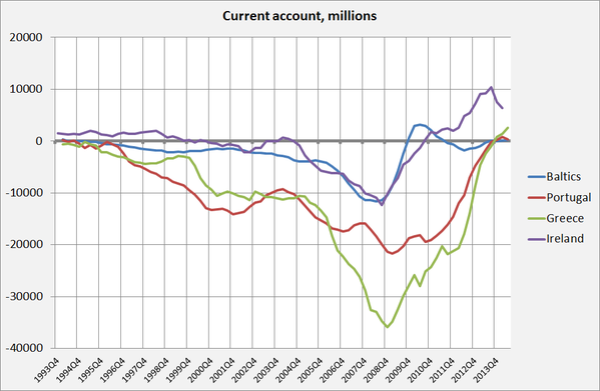Lose-lose, in Greece
Creditors might have burned something like 40 to 60 billion Euro of their wealth by “maintaining ELA (Emergency Liquidity Assistance) to Greek banks at the current level”. Greek banks need ELA to be able to buy Euronotes to put in the ATP machines and to enable Greek to wire money abroad. Greek are not able to do anymore, or only to a very limited extent and turning off the ELA tap has sent the Greek economy into a downspin. Again. GDP might decline with another 5 to 10% (even when we reopen the ELA tap today), the grey and black economy will increase, taxes will dwindle and unemployment might top 30 or even 35%. While, using the creditor logic, Greece did not do worse than other indebted countries (graph). To he contrary. As I see it, Greece has become a failed state already – which is another crippling hit not just to Greece but also to the Euro project. Tsipras guarantees pensions and deposits – but he can’t (at least not in Euro) because the ELA tap is off (and also because the ECB has restricted Greek banks to raise funds in other ways). I doubt if even Mario Draghi can do this, at the moment.
Should the ECB be allowed to have such powers to wreck entire countries (see also this post by Michael Hudson)? No, of course. But is has this power and we have to leave this to future debates in the European parliament. At this moment the real question is: why did the ECB and the other creditors do this? After turning off the ELA tap Greek debts immediately became even more unsustainable than they already were (mind: this is not about new debts, this is about rolling over old debts!) and there just can’t be any pretend and extend anymore (as the IMF already admitted). There might be sheer ignorance – Jens Weidmann, president of the Bundesbank, is supposed to have argued to diminish the amount of ELA on the balance sheets of the Greek banks, confusing stocks with flows. How should something like that even happen! Should the Greek banks transfer their real estate to the Bank of Greece, or something like that, to pay down ELA! Or rob the depositors and wire remaining deposits to the Bank of Greece? I have no idea. Other central bankers might have a little more understanding of monetary matters, but even than the question is: why? The creditors burned tens of billions of their wealth, sent the Greek economy into a downspin, wrecked the Euro project – and this all to evict Syriza from power and to show that they can hurt the poorest pensioners in Greece? Or because Malta, Cyprus, Italy, Spain and Portugal love it, when VAT rates on tourism in Greece are increased (on hotels they were originally set to quadruple, from 6,5% to 23%). What a total nonsense. In such a situation you are pressing people to lower intended rates of taxes on (profit)income with 1% while quadrupling some tax rates on spending by foreign tourists? Caveat: above, I do not blame the Syriza government for not caving in to the demands of the creditors for a simple reason: they did cave in and the remaining battles where just to protect at least some people and some businesses.

































Get out, Greece. Do it gradually: let people have their euros and euro accounts. But start spending New Drachmas into the economy along with govt euro spending. Say a mix of 75/25 euros/NDs initially. Tax most of NDs back and spend them anew. Then NDs achieve value and confidence. Don’t panic because of intial turbulence amplified by media, bankster and eurocrat hyperventilation. Think on a longer horizon than a couple of months.
… and do something resembling what Malaysia did in 1997. They demanded that all overseas assets held by domestic citizens in ringgit should be repatriated within – I seem to remember – 3 months. Demand that all overseas liquid assets in euros held by Greek citizens are repatriated before some deadline. Or else.
That looks to me like very sound, practical advice.